article_detail
Date Published: 23/10/2023
10 unique natural wonders in the Region of Murcia!
Icy cold springs, moonscapes, badlands and enchanted natural cities in the Costa Cálida!
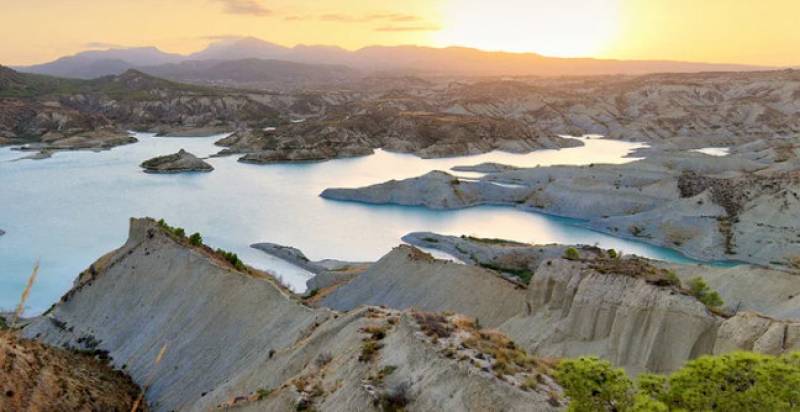 Far from being simply a stretch of coastline in the western Mediterranean, the Region of Murcia has a fantastically varied landscape, and the following selection has been made by the regional tourism institute (ITREM) to illustrate this wealth of natural beauty!
Far from being simply a stretch of coastline in the western Mediterranean, the Region of Murcia has a fantastically varied landscape, and the following selection has been made by the regional tourism institute (ITREM) to illustrate this wealth of natural beauty!
- Salto del Usero
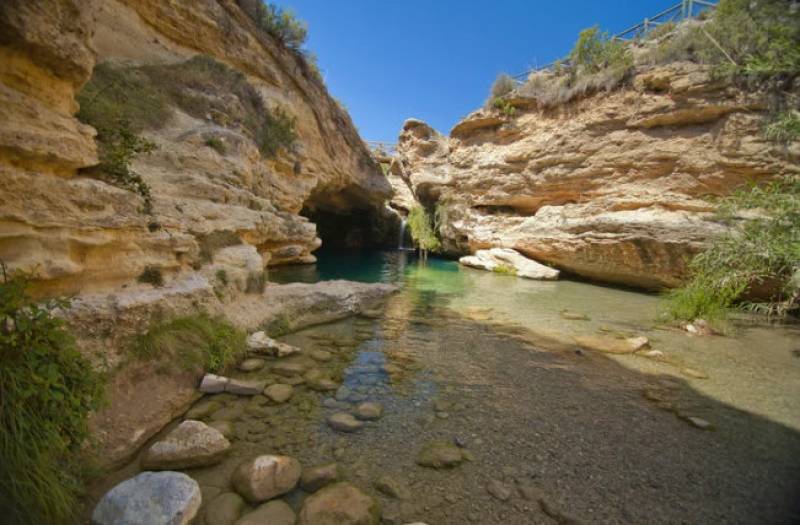 Just outside the town of Bullas is the popular beauty spot of the Salto del Usero, where icy cold water emerges from a rock face into a series of pools which have been declared a Natural Monument.
Just outside the town of Bullas is the popular beauty spot of the Salto del Usero, where icy cold water emerges from a rock face into a series of pools which have been declared a Natural Monument.
For geologists this is a fascinating illustration of erosion procedures in a limestone and travertine rock formations, with the water falling some 4 metres and wearing away the rocks beneath. But this is an immensely popular place to visit for those without any interest in geology as well, particularly during the hot summer, when intrepid bathers plunge into the cold water and enjoy the walking baths in the surrounding countryside.
A word of warning: due to its popularity, access to the Salto del Usero has to be restricted, and visitors need to book through the Bullas Town Hall website.
- Cañón de Almadenes
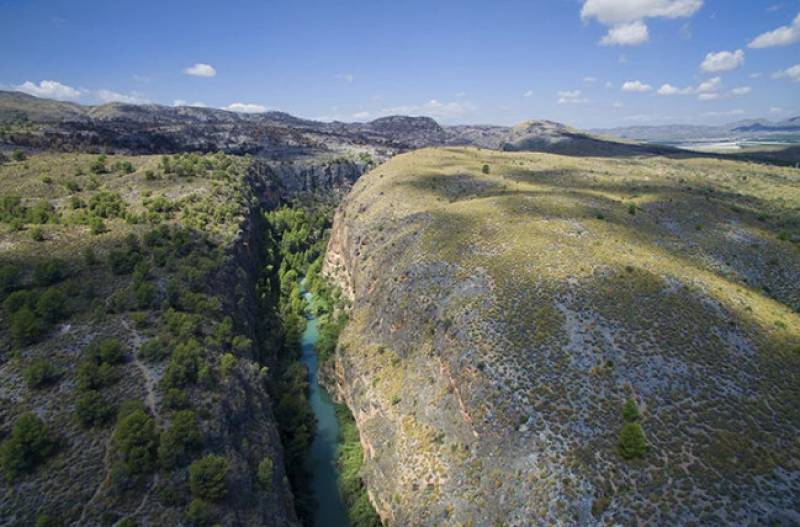 The Almadenes canyon has been formed over millions of years by the River Segura as it flows through the hills and mountains between the municipalities of Calasparra and Cieza, and the deep gorge is home to a richly diverse range of flora and fauna. Here the shade is provided by elm, ash and willow trees, and among the wildlife are eagle owls, short-toed snake eagles and even otters.
The Almadenes canyon has been formed over millions of years by the River Segura as it flows through the hills and mountains between the municipalities of Calasparra and Cieza, and the deep gorge is home to a richly diverse range of flora and fauna. Here the shade is provided by elm, ash and willow trees, and among the wildlife are eagle owls, short-toed snake eagles and even otters.
In recent years there has been a huge growth in adventure tourism in this part of Murcia, including descents of the river in inflatable rafts and by canoe, but it is also a haven for nature lovers and walkers. The tourist office of Calasparra organizes guided visits to the Los Mingotes cave, in which prehistoric rock art paintings can be found, while back out in the open this is most definitely an area where you won’t want to forget your camera and binoculars!
- Monte Arabí
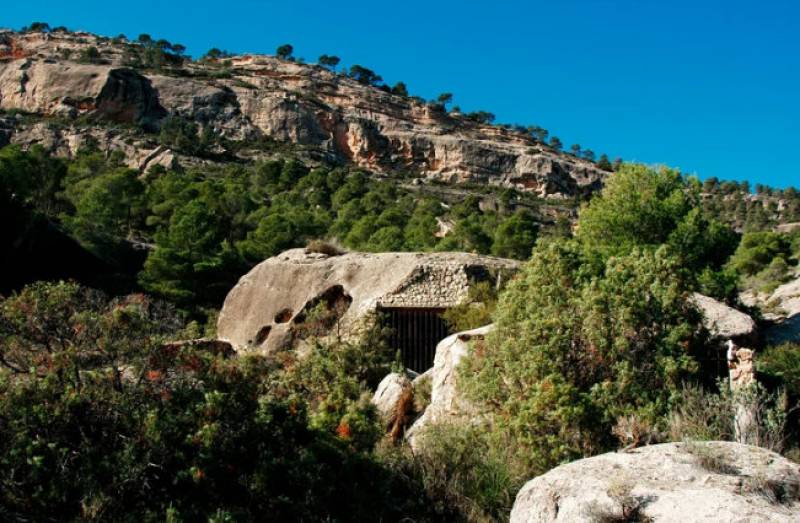 In Yecla, in the north of the Region of Murcia, is the spectacular landscape of Monte Arabí, another area where erosion has played its part in creating what is in some places an almost supernatural landscape, full of potholes, caves, shelters and curved rock surfaces.
In Yecla, in the north of the Region of Murcia, is the spectacular landscape of Monte Arabí, another area where erosion has played its part in creating what is in some places an almost supernatural landscape, full of potholes, caves, shelters and curved rock surfaces.
Here again there are prehistoric art treasures, some of which were included in the declaration of the World Heritage Site of prehistoric art along the eastern coastal regions of Spain in 1998.
- Barrancos de Gebas
 Visiting the Barrancos de Gebas is a little like finding a moonscape here on Earth. Located between Alhama de Murcia and Librilla and with the Algeciras reservoir providing a magnificent backdrop, this is one of the best example of “badlands” landscapes in the Region of Murcia, boasting a breathtaking range of colours, shapes and contrasts.
Visiting the Barrancos de Gebas is a little like finding a moonscape here on Earth. Located between Alhama de Murcia and Librilla and with the Algeciras reservoir providing a magnificent backdrop, this is one of the best example of “badlands” landscapes in the Region of Murcia, boasting a breathtaking range of colours, shapes and contrasts.
No-one visiting this area for the first time can fail to be impressed by this brutally harsh but beautiful environment, and it seems barely believable that just a few small plants are able to survive here!
- The Mirador Alto de Bayna
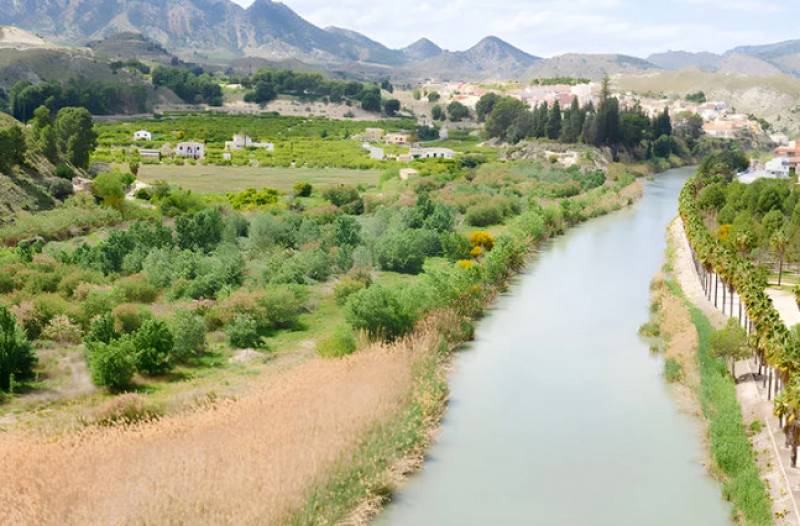 This viewing point in the municipality of Blanca gives visitors marvellous views over the weir of the Azud de Ojós, the River Segura and the town itself.
This viewing point in the municipality of Blanca gives visitors marvellous views over the weir of the Azud de Ojós, the River Segura and the town itself.
While in the area, you’ll want to take a walk along the riverbanks and in the lush countryside of this green oasis in the heart of Murcia!
- Estrecho de Bolvonegro
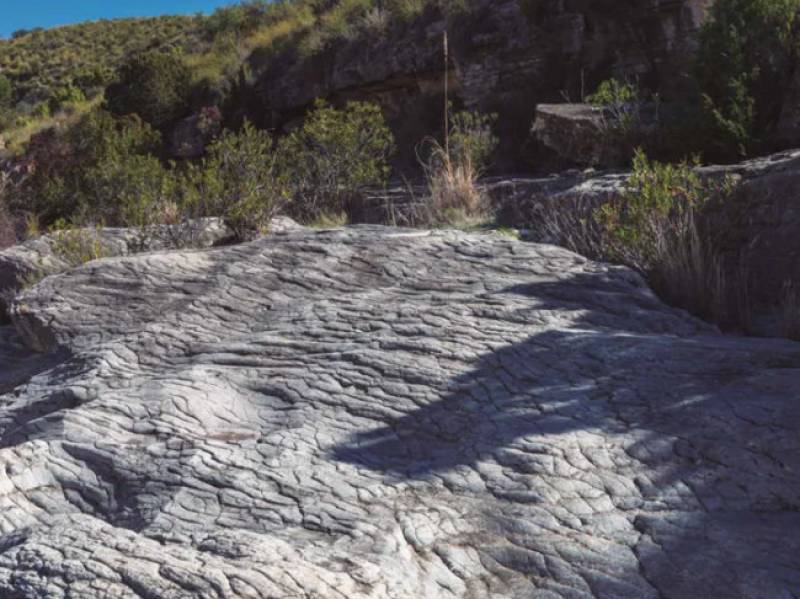 In order to get to the narrow gorge of Bolvonuevo, first you have to follow the 6-kilometre path of the same name through an area which is protected as part of the Natura 2000 network, and where the Alhárabe and Benamor rivers meet to form the Río Moratalla.
In order to get to the narrow gorge of Bolvonuevo, first you have to follow the 6-kilometre path of the same name through an area which is protected as part of the Natura 2000 network, and where the Alhárabe and Benamor rivers meet to form the Río Moratalla.
This is a true hidden gem, protected by the dense plant life and containing a huge number of features which are of natural, geological and archaeological interest.
The name of the gorge itself is derived from “Gorgonegro”, meaning “black throat”, and its dark walls have been formed by the action of water on the rock over millions of years.
- The regional park of Calblanque
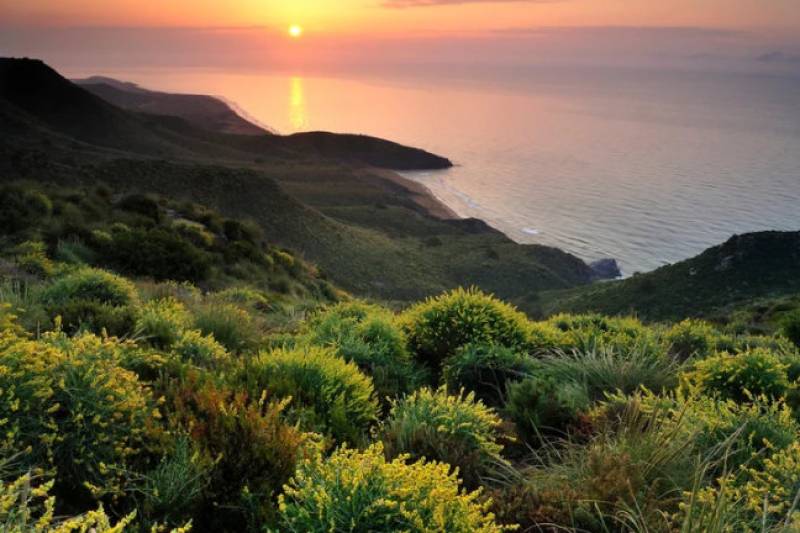 On the coast of Cartagena, between Cabo de Palos and Portmán, is the unspoilt area of the regional park of Calblanque, a protected natural environment which is home to a huge variety of wildlife as well as being spectacularly beautiful.
On the coast of Cartagena, between Cabo de Palos and Portmán, is the unspoilt area of the regional park of Calblanque, a protected natural environment which is home to a huge variety of wildlife as well as being spectacularly beautiful.
This is a perfect place to follow the many walking paths – or to make up your own route! – enjoy the fine sand of the natural beaches and enjoy some of the finest sunsets in the Region of Murcia, accompanied by the contrasts between the sea and the dense undergrowth along the paths which criss-cross the area.
- Las Fuentes del Marqués
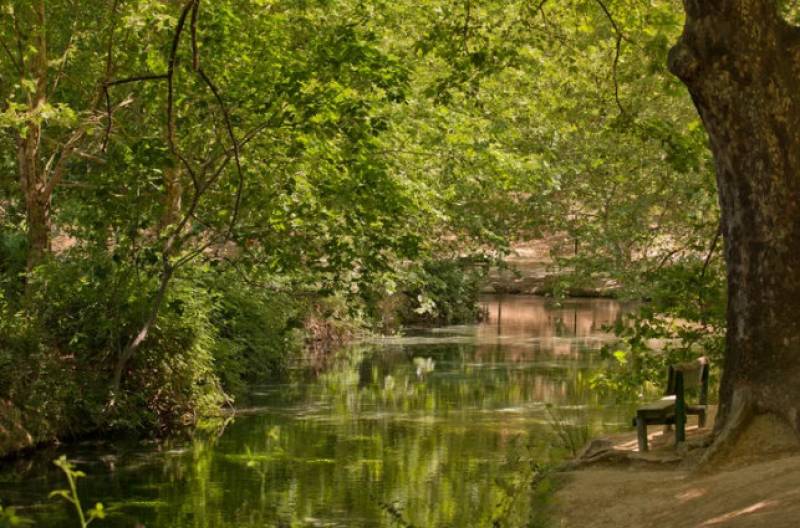 Las Fuentes del Marqués is a beauty spot in the outskirts of Caravaca de la Cruz where the special micro-climate and natural springs make it a perfect home for many plant and animal species.
Las Fuentes del Marqués is a beauty spot in the outskirts of Caravaca de la Cruz where the special micro-climate and natural springs make it a perfect home for many plant and animal species.
Arguably the best times to visit are during the spring and the autumn, when the trees and plants are a riot of colour!
- The eroded rocks of Bolnuevo
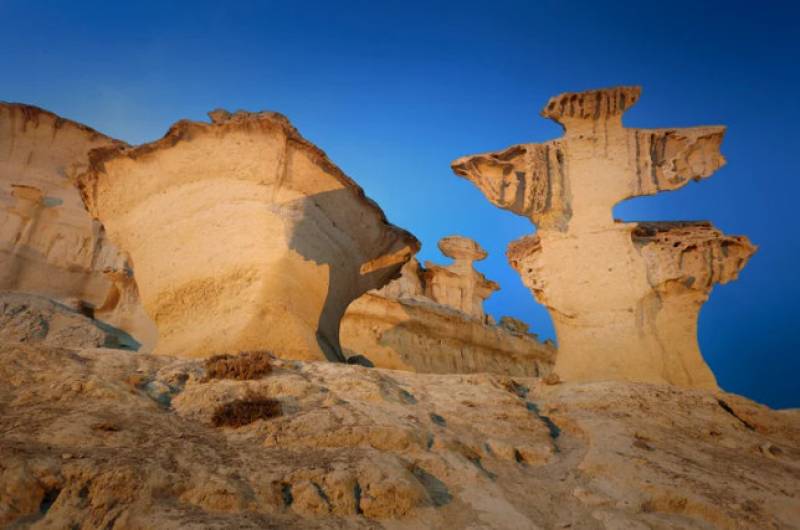 The Gredas, the eroded rocks of Bolnuevo near Puerto de Mazarrón, have been formed not only by the action of the sea on the limestone but also by the wind, making them unique in the Costa Cálida as they look out over the beach like the skyscrapers of an enchanted city.
The Gredas, the eroded rocks of Bolnuevo near Puerto de Mazarrón, have been formed not only by the action of the sea on the limestone but also by the wind, making them unique in the Costa Cálida as they look out over the beach like the skyscrapers of an enchanted city.
This is another location which has been declared a Natural Monument of the Region of Murcia, and never fails to impress visitors as well as being of great cultural and scientific importance.
- Isla del Fraile
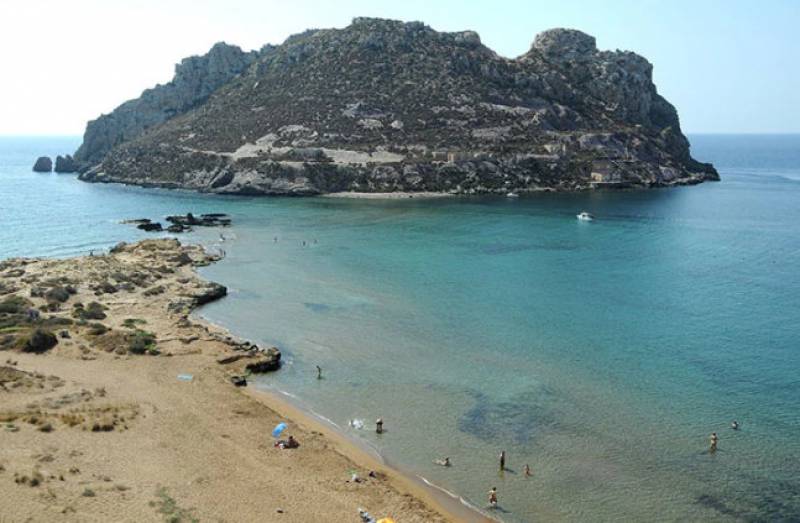 The small islet known as Isla del Fraile is just a few metres offshore from the beach of Playa Amarilla in Águilas, in the south-west of Murcia, and is known to have been inhabited by the Romans and, according to recent archaeological discoveries, as long ago as the Bronze Age.
The small islet known as Isla del Fraile is just a few metres offshore from the beach of Playa Amarilla in Águilas, in the south-west of Murcia, and is known to have been inhabited by the Romans and, according to recent archaeological discoveries, as long ago as the Bronze Age.
Alongside these ancient sites there are also the structures built for human activity in the early 20th century, but nowadays this is above all a popular destination for a day at the beach – particularly for scuba divers and those with small boats!
These are just a few sights in the Region of Murcia, but of course the list is endless and once you’ve seen a few you won’t be able to stop yourself exploring more!
Source: ITREM
Contact Spanish News Today: Editorial 966 260 896 /
Office 968 018 268






































